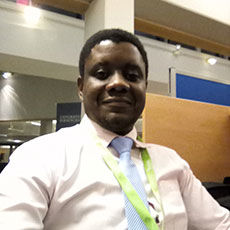
My research interrogates how policy and law-making on climate change have developed in post-colonial states as a tool for empowering or disempowering individuals and groups impacted.
My PhD was funded by a University of Birmingham Global Challenges PhD Scholarship and a National Geographic Society Early Career Grant and received supervision from the University of Birmingham Law School and International Development Department. I used a postcolonial and powershift lens to investigate Kenya’s Climate Change Act-making process from 2006 to 2016. Specifically, I examine how this process enhances or constrains the incorporation of local indigenous knowledge and practices (LIKP). This knowledge system has been developed by indigenous and local communities (ILC) over many generations and used for understanding and responding to environmental changes, including climate change.
My research found that Knowledge is important in climate change policy and law-making processes. It shapes the level of power and the interactions among policy actors, including those found at community, sub-national and national levels. In Kenya, the ILCs are mostly smallholder farmers who dominate the economy, accounting for 40% of the overall workforce and employing 70% of the rural workforce. They are not only victims of climate change but are agents of change who are developing and using their LIKP. They have political capital resulting from their numbers and social capital from their ability to work together to develop and use their knowledge system, which is relevant to their well-being and the environment. Their political and social capital is a source of their power and influence on climate decision-making. However, these policy actors competed with more powerful policy actors who prioritise scientific and professional knowledge in the decision and policy-making spaces. The differential levels of power limit the level of participation of ILCs in the decision-making processes that tackle climate change and, therefore, the incorporation of their knowledge.
In my research, I interviewed policy actors from local communities to national, international, and supra-national organizations as well as academic experts and lead authors of IPCC reports. Through these engagements, I thoroughly understood trends regarding institutional and governance contributions to tackling climate change. I analysed the data and developed an Actor-Knowledge-Institutions (AKI) Framework that could be used to inform research and guide inclusive climate change policy and law-making processes. The framework combines three interdependent themes of actor, knowledge, and institutional arrangements that have been examined mostly in isolation by scholarship.
My research also had a policy-influencing role. I developed evidence-based policy recommendations on the involvement of local communities and the incorporation of LIKP in combating climate change. Using these, I contributed as an Expert Reviewer of the UN Intergovernmental Panel on Climate Change (IPCC) Sixth Assessment Report processes. My contributions were well received by the contributing authors, and I was acknowledged in the final report published in 2022. In addition, I have sat on panels discussing the co-production of climate change response using different knowledge systems, such as the 2019 Adaptations Futures Conference held at the University of Chile, Santiago. My contribution was captured by Chilean Media and in an IIED blog (https://www.facebook.com/theIIED/posts/10156845244867879). I equally shared the finding of my PhD at the Africa Evidence Conference and emerged as runner-up of the 2020 Africa Evidence Leadership Award (AELA) (https://aen-website.azurewebsites.net/en/learning-space/article/216/)
In 2022, I was awarded a three months Economic and Social Research Council (ESRC) impact-related post-doctoral project in collaboration with the Kenya National Farmers Federation (KENAFF). Using the AKI framework developed from my PhD, I worked with national policy makers, civil society organisations, and private and public institutions of the farm forest and agroforestry sector at decentralised and central levels in Kenya. Directly engaging with different policy actors in Kenya’s climate change policy and law-making process, which was not possible during my PhD due to COVID-19 restrictions, was important to me. These engagements enabled me to understand better the climate change landscape and the challenges of the co-production of responses using different knowledge systems. During the engagements I developed (i) a policy brief on intergenerational knowledge and asset transfer to empower vulnerable groups often left out of decision-making published in the KENAFF Newsletter (The Farmers Voice), (ii) an infographic on the incorporation of LIKP to maximise climate action in the Forest and agroforestry sectors, (iii) published a newspaper on the Kenya Broadcasting Corporation (KBC) ((https://www.kbc.co.ke/news/opinion-editorial/article/34940/policy-reform-battling-climate-change-key-for-effective-youth-participation-in-agriculture), (iv) sat as a panelist at the KENAFF annual general assembly meeting and its National Youth Convention in December 2022 and (v) participated in tree planting events.
This post-doctorate project enabled me to define areas for my future research. These include (i) how to fully capture, transform and communicate LIKP datasets which are expressed in various ways, including communities’ observations, images, local weather station data, and narratives, etc. legalistic ways, and making it available to policy actors during climate change policy and law-making process, and (ii) overcoming bureaucratic structures that do not recognise the everyday informal language of lay people where local knowledge is embedded.
